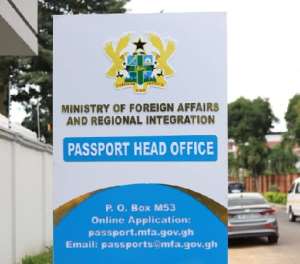
There is deep-seated corruption and bribery canker undermining Ghana's passport acquisition system.
Retired officials, security personnel, and even law enforcement officers have been implicated in charging exorbitant fees to expedite passport processing, tarnishing the integrity of the system.
Contractors involved in the printing and alteration of passport dates have been found to charge hefty amounts ranging from GHS 1,500 to GHS 2,000, promising to deliver passports within a week.
These fraudulent deals have created a thriving underground market, where individuals with deep pockets can bypass the normal passport processing channels.
Disturbingly, even members of the police service, immigration personnel, and national security officers have been identified as facilitators of these corrupt practices.
The involvement of individuals entrusted with upholding the law and ensuring the security of the nation further exacerbates the gravity of the situation.
These officials in collaboration with some staff of the Passport Office, manage to change date of appointments of applicants to go through the process of biometric, capturing and verification within a shortest possible waiting time at a fee of GHC500.
They subsequently find a way to have the passport booklets printed at a fee of GHC500 instead of GHC100. All these process are done with the public servants in charge of the digitalization system at the Passport Office.
The failure of officials to ensure that passports are printed and renewed within the required timeframe is also contributing to the problem.
There is also a lack of differentiation between passport renewals and new passport applications, with applicants being subjected to the same documentation and verification requirements.
The prevalence of corruption within the Ghanaian passport system has raised significant concerns among citizens and officials alike.
The failure of officials to address these issues and enforce strict measures to prevent middlemen otherwise known as 'Goro Boys' from milking the system has added to the growing discontent.
The consequences of this corruption are far-reaching. Firstly, it undermines the principles of fairness, equality, and transparency that should guide a country’s passport system. It creates a stark divide between those who can afford to pay bribes and those who cannot, perpetuating social inequalities.
Furthermore, this corruption hampers the country’s reputation, both domestically and internationally. Ghana is known for its rich cultural heritage, economic progress, and commitment to good governance.
However, the prevalence of corruption within a vital governmental institution such as the passport system tarnishes the image of the nation.
In response to these revelations, it is imperative for the Ghanaian government to take immediate action. Firstly, a thorough investigation must be conducted to identify those involved in corrupt practices and hold them accountable. This includes retired officials, security personnel, contractors, and law enforcement officers found to be complicit.
Additionally, the government must implement robust reforms within the passport system. This can involve the digitalization of the processes, increased transparency, and the establishment of an independent oversight body to ensure accountability and prevent further corruption.
Whistleblower protection programs should be established to encourage individuals to come forward to report cases of abuse without fear of reprisal.
The Ghanaian passport system is in dire need of reform to restore public trust and uphold the integrity of the nation. Swift and decisive action is required to weed out corruption, punish those involved, and establish a transparent and efficient system that serves all citizens equally. Only through such measures can Ghana regain its reputation as a beacon of good governance and integrity.
Vice President Dr Mahamudu Bawumia introduced an electronic application method for passport procurement, but many citizens have faced delays as long as over six months because the officials have found away to manipulate the smooth process of the system.
Corruption has become so prevalent that some applicants have been forced to pay bribes to have their passports processed sooner. The system needs a radical overhaul before anything will change.
-DGN online




 Akufo-Addo’s recent attitude, utterances connote an arrogant nature, smack of an...
Akufo-Addo’s recent attitude, utterances connote an arrogant nature, smack of an...
 NDC calls for immediate termination of contracts between SML and GRA
NDC calls for immediate termination of contracts between SML and GRA
 NDC demands retrieval of monies paid to SML, calls for the prosecution of person...
NDC demands retrieval of monies paid to SML, calls for the prosecution of person...
 NDC accuses President Akufo-Addo of attempting to cover up corruption and crimin...
NDC accuses President Akufo-Addo of attempting to cover up corruption and crimin...
 Election 2024: ‘I don't want issues of independent candidature to plague NPP’ — ...
Election 2024: ‘I don't want issues of independent candidature to plague NPP’ — ...
 2024 elections: Bawumia avoiding economic discourse because he has failed — Kwak...
2024 elections: Bawumia avoiding economic discourse because he has failed — Kwak...
 Mustapha Ussif’s ‘Best African Sports Minister’ award signifies his exceptional ...
Mustapha Ussif’s ‘Best African Sports Minister’ award signifies his exceptional ...
 Anti-LGBQI+ Bill: High Court’s verdict was predetermined – Sam George
Anti-LGBQI+ Bill: High Court’s verdict was predetermined – Sam George
 Justification for continuation of SML-GRA contract ‘hogwash’ – Sammy Gyamfi
Justification for continuation of SML-GRA contract ‘hogwash’ – Sammy Gyamfi
 Bawumia is a liar, google it and see – Osofo Kyiri Abosom
Bawumia is a liar, google it and see – Osofo Kyiri Abosom
